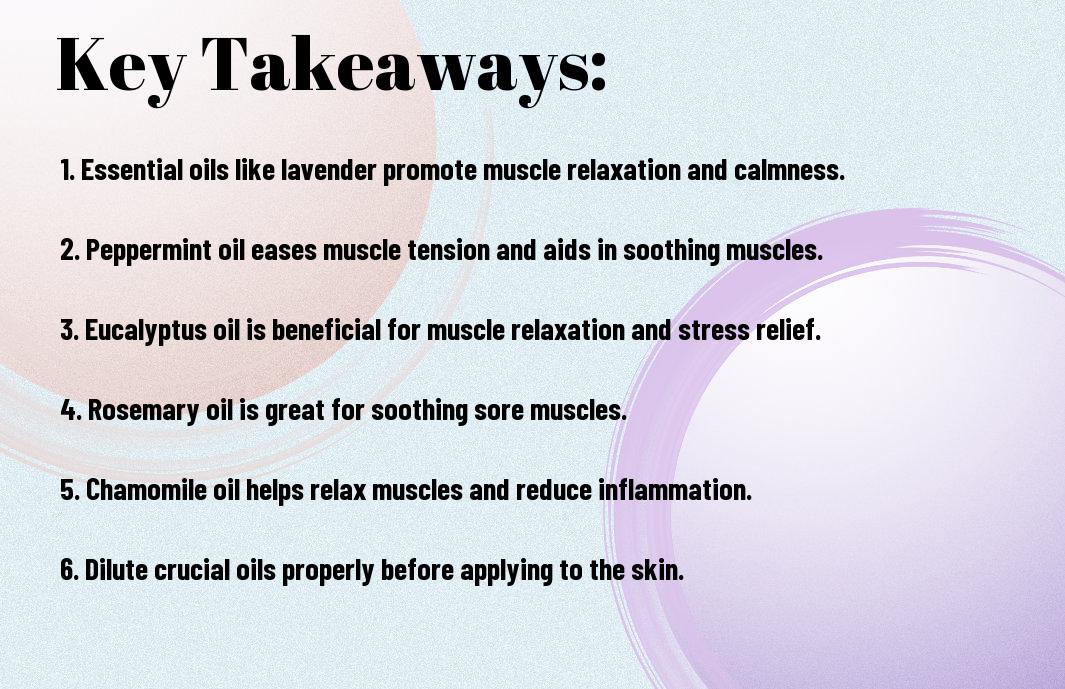There’s a powerful connection between your mind and body when it comes to relaxation, and aromatherapy can be a transformational tool in this journey. By incorporating specific imperative oils into your routine, you can soothe your muscles, alleviate tension, and enhance your overall well-being. In this blog post, you will discover the secrets of using aromatherapy for muscle relaxation, allowing you to tap into the profound healing potential of these natural remedies.
Key Takeaways:
- Aromatherapy Oils: Utilize vital oils such as lavender, peppermint, and eucalyptus to help relax and soothe tight muscles.
- Aromatherapy Techniques: Experiment with diffusers, massages, and baths to incorporate aromatherapy into your muscle relaxation routine.
- Mind-Body Connection: Embrace the connection between your mind and body by practicing deep breathing and mindfulness techniques while using aromatherapy for muscle relaxation.
The Science Behind Aromatherapy
How Essential Oils Affect the Body
For centuries, important oils have been used for their therapeutic benefits. When inhaled or applied to the skin, these potent plant extracts can have a profound impact on your body and mind. Essential oils work through the limbic system, which is the part of your brain that controls emotions, memories, and sensory perceptions. When you inhale the aroma of an important oil, it can trigger powerful emotional and physical responses.
The Role of Smell in Relaxation
With your sense of smell being directly linked to the brain’s limbic system, it’s no wonder that certain scents can help you relax and unwind. Essential oils like lavender, chamomile, and eucalyptus have been shown to have calming effects on the body, reducing stress and promoting relaxation. By incorporating these soothing scents into your daily routine, you can create a peaceful and tranquil environment that promotes overall well-being.
The limbic system is the part of your brain responsible for regulating emotions and memories. When you inhale the aroma of an important oil, it can evoke feelings of calmness, reduce anxiety, and improve your mood. By tapping into the power of scent, you can easily enhance your relaxation practices and promote a sense of inner peace.
Essential Oils for Muscle Relaxation
Little do you know that important oils are powerful tools in helping you achieve muscle relaxation. These natural oils can be used in various ways to soothe your muscles and calm your mind.
Lavender Oil: The Calming Effect
Relaxation Lavender oil is well-known for its calming and relaxing properties. When applied to the skin or inhaled through aromatherapy, it can help reduce muscle tension and promote a sense of calmness. This gentle oil is perfect for winding down after a long day and releasing the built-up stress in your muscles.
Peppermint Oil: Cooling and Soothing
Lavender Peppermint oil provides a cooling sensation that can help soothe sore muscles and reduce inflammation. Its refreshing scent can also help alleviate headaches and increase focus and energy levels. When applied topically, peppermint oil can leave a tingling sensation that relieves muscle discomfort and enhances relaxation.
With its menthol content, peppermint oil is a natural muscle relaxant that can ease tension and promote circulation. This invigorating oil is perfect for use in massages or added to a bath to soothe tired muscles and rejuvenate your body.
Eucalyptus Oil: Reducing Inflammation
Any Eucalyptus oil is known for its anti-inflammatory properties, making it an excellent choice for reducing muscle pain and swelling. When used in aromatherapy or applied topically, eucalyptus oil can help improve circulation and speed up the healing process for overworked muscles.
Reducing Its cooling effect can provide immediate relief to sore muscles, while its analgesic properties can help numb pain and discomfort. Adding a few drops of eucalyptus oil to your bath or massage oil can enhance the relaxation benefits and promote muscle recovery.
Frankincense Oil: Anti-Inflammatory Properties
Soothing Frankincense oil has powerful anti-inflammatory properties that can help reduce muscle soreness and stiffness. This ancient oil is known for its calming effect on the mind and body, making it a great choice for relaxation and muscle recovery.
To experience the full benefits of frankincense oil, you can mix it with a carrier oil and massage it onto sore muscles, or add a few drops to a diffuser to create a relaxing environment. Its soothing aroma can help you unwind and release tension in both your muscles and mind.
Blending Essential Oils for Maximum Relaxation
Despite the wide array of crucial oils available, creating a blend that suits your needs for muscle relaxation is simpler than you think. By combining the right oils, you can enhance their individual properties to create a powerful mix that promotes relaxation and eases muscle tension.
Creating a Customized Blend
Creating a customized blend of crucial oils allows you to tailor the mixture to your preferences and needs. Start by selecting oils that are known for their muscle-relaxing properties, such as lavender, peppermint, eucalyptus, and chamomile. Experiment with different ratios until you find a blend that works best for you.
Pre-Blended Oils for Muscle Relaxation
Pre-blended oils offer a convenient option for those who prefer not to mix their own. These ready-to-use blends often combine crucial oils known for their muscle-soothing effects, making it easy to enjoy their benefits without the hassle of blending.
PreBlended crucial oils are designed to offer a harmonious combination of oils that work together to promote relaxation and relieve muscle tension. These blends are expertly crafted to deliver results, making them a convenient option for those looking for quick relief.
Tips for Blending Essential Oils
When blending crucial oils for muscle relaxation, keep these tips in mind to create a potent and effective mix:
- Mix no more than 3-4 oils to avoid overpowering scents.
- Start with a base oil like sweet almond oil to dilute the blend.
- Experiment with different ratios to find what works best for you.
Though blending oils for muscle relaxation may seem intimidating at first, with practice, you’ll become more comfortable creating customized blends that cater to your specific needs.
Methods of Application
Topical Application: Massage and Skin Absorption
Not only does topical application of aromatherapy oils through massage help relax your muscles, but it also allows for direct absorption through your skin. When imperative oils are gently massaged onto your skin, they can penetrate into the bloodstream and reach the muscles, providing immediate relief from tension and discomfort.
Inhalation: Direct and Indirect Methods
With inhalation, you can experience the benefits of aromatherapy through direct methods like inhaling imperative oils from a tissue or the bottle itself, or indirect methods like using a diffuser to disperse the oils into the air around you. This way, you can relax your muscles simply by breathing in the therapeutic scents of the imperative oils.
It’s important to note that direct inhalation should be done in moderation and for short periods, as prolonged exposure may lead to adverse reactions such as headaches or nausea.
Bathing: Soaking Away Muscle Tension
For a luxurious way to relax your muscles, consider adding a few drops of imperative oils to your bathwater. By soaking in this fragrant blend, you allow the healing properties of the oils to seep into your skin, soothing your muscles and calming your mind at the same time.
The warmth of the water also helps to increase circulation, aiding in the relaxation of your muscles and promoting a sense of overall well-being.
Aromatherapy Techniques for Muscle Relaxation
Once again, let’s examine the world of aromatherapy techniques that can help you achieve deep muscle relaxation. Aromatherapy, when combined with specific relaxation methods, can amplify the benefits and promote a profound sense of calmness and ease in your body.
Progressive Muscle Relaxation with Aromatherapy
Relaxation – Progressive Muscle Relaxation involves tensing and then relaxing each muscle group in your body systematically. When you add aromatherapy to this practice, using calming crucial oils like lavender or chamomile, you can enhance the overall experience. The soothing scents can help release tension from your muscles as you go through the relaxation process, promoting a deeper state of relaxation.
Visualization and Guided Imagery
Relaxation – Visualization and Guided Imagery is a powerful technique where you create mental images to promote relaxation. When combined with aromatherapy, such as diffusing uplifting oils like peppermint or eucalyptus, you can enhance the visualizations and deepen your relaxation state. Imagine the aroma of the crucial oils flowing through your muscles, bringing a sense of release and tranquility.
Visualization and guided imagery can be particularly effective when using aromatherapy for muscle relaxation. You can visualize the crucial oils penetrating your muscles, soothing them and melting away any tension or tightness. This combined practice can help you achieve a profound sense of relaxation and well-being.
Yoga and Stretching with Aromatherapy
Relaxation – Engaging in gentle yoga poses and stretching exercises can be wonderful for releasing muscle tension. When you incorporate aromatherapy into your practice by using grounding oils like cedarwood or frankincense, you can deepen the stretch and promote relaxation in your muscles. The calming scents can create a serene environment for your practice, enhancing the overall experience.
Visualization – Practicing yoga and stretching with the addition of aromatherapy can help you connect mind and body. Visualize the crucial oils seeping into your muscles, allowing you to stretch deeper and release any lingering tension. This holistic approach can lead to a sense of balance and rejuvenation in both your body and mind.
Safety Precautions and Contraindications
Allergic Reactions and Skin Sensitivity
Keep in mind that important oils are potent substances, and some people may be sensitive or allergic to certain oils. Before using any important oil for muscle relaxation, it is important to perform a patch test on a small area of your skin. If you experience any redness, itching, or irritation, discontinue use immediately.
Pregnancy and Breastfeeding Considerations
For those who are pregnant or breastfeeding, special precautions should be taken when using important oils for muscle relaxation. It is recommended to consult with your healthcare provider before using any important oils during these stages.
Pregnancy is a delicate time, and certain important oils may not be safe for you or your baby. Some oils can stimulate contractions or affect hormone levels, so it is crucial to seek professional guidance before incorporating them into your routine.
Medication Interactions and Health Conditions
To ensure your safety, it is important to be aware of any potential interactions between important oils and medications you may be taking. Some important oils can interfere with certain medications and exacerbate health conditions.
Health conditions such as epilepsy, high blood pressure, or liver disease may require extra caution when using important oils for muscle relaxation. Always disclose your health history and current medications to a qualified aromatherapist or healthcare provider.

Summing up
So, by incorporating aromatherapy into your routine for muscle relaxation, you are not only soothing your body but also calming your mind. The vital oils can help release tension, improve circulation, and promote a sense of well-being. Remember to choose scents like lavender, peppermint, or eucalyptus to target different areas of muscle discomfort.
FAQ
Q: What is Aromatherapy?
A: Aromatherapy is a holistic healing treatment that uses natural plant extracts to promote health and well-being. Essential oils, the pure essence of plants, have been used for centuries to relax the body and mind.
Q: How can Aromatherapy help with muscle relaxation?
A: Aromatherapy can help with muscle relaxation by using vital oils that have soothing and anti-inflammatory properties. When applied through massage or inhaled through diffusers, these oils can help reduce muscle tension, ease soreness, and promote relaxation.
Q: What are the best vital oils for muscle relaxation?
A: Some of the best vital oils for muscle relaxation include lavender, peppermint, eucalyptus, chamomile, and rosemary. These oils can be used alone or blended together to create a customized aromatherapy experience for soothing tired muscles and calming the mind.

